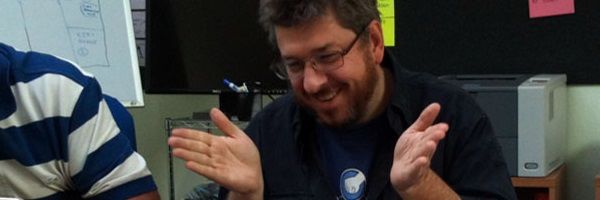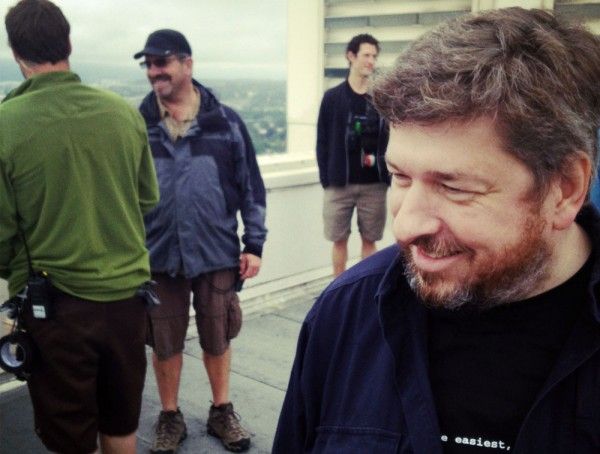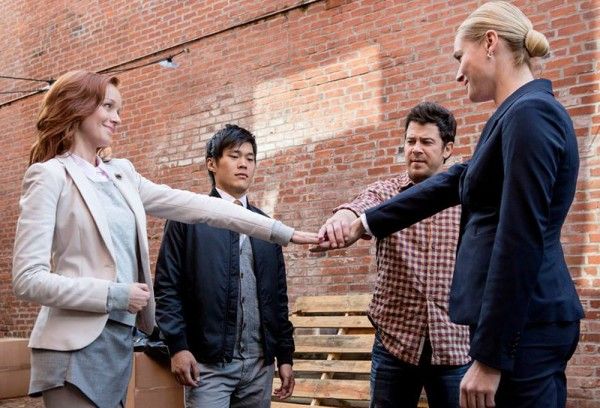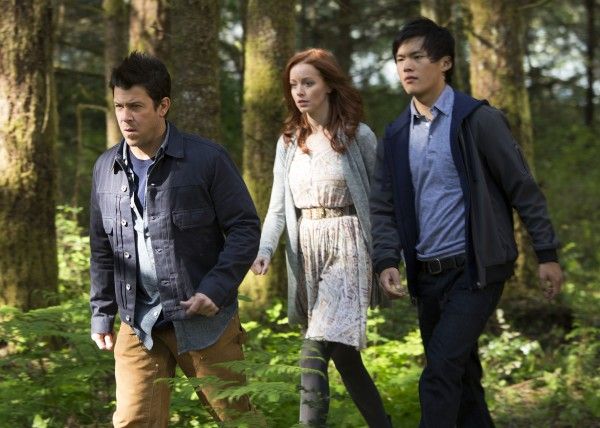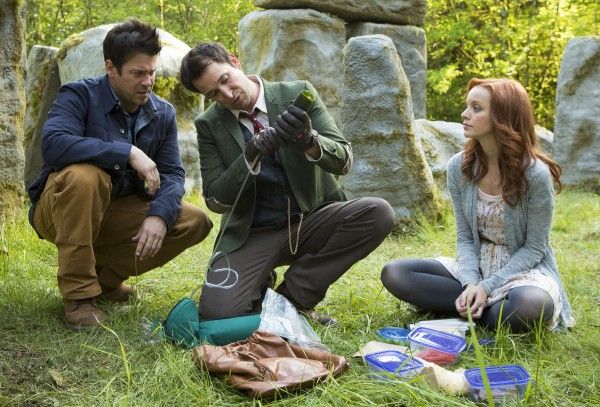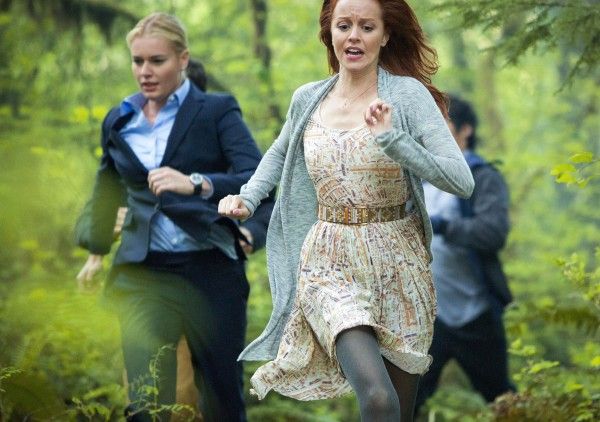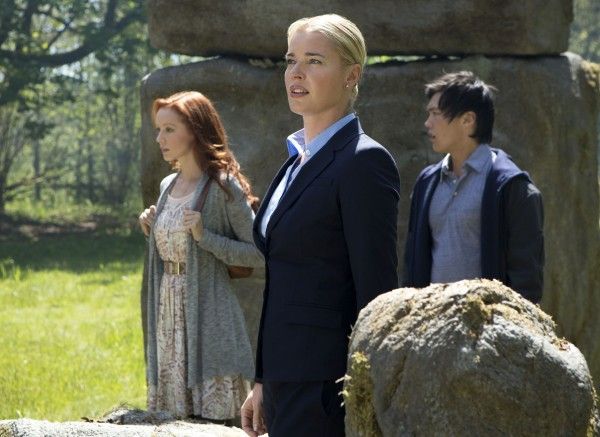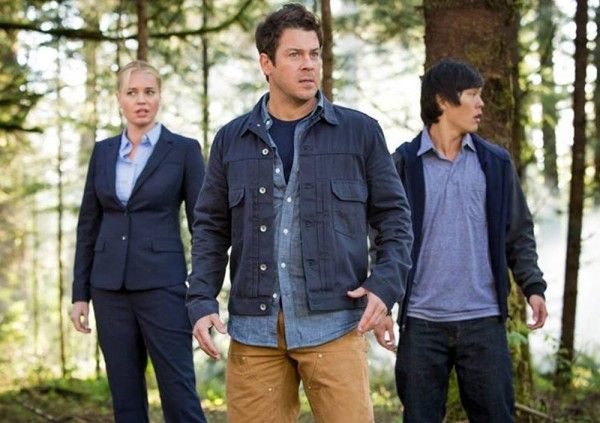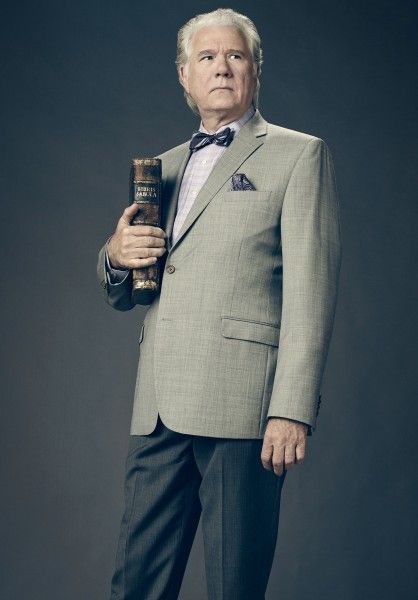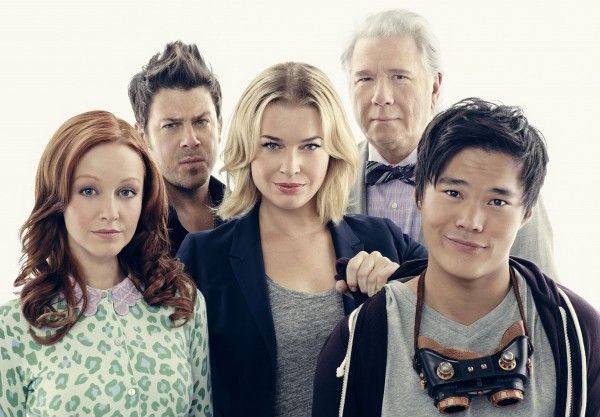Based on TNT’s hit movie franchise, the delightfully fun adventure series The Librarians centers on an ancient organization hidden beneath the Metropolitan Public Library dedicated to protecting an unknowing world from the secret, magical reality hidden all around. Jake Stone (Christian Kane), Cassandra Cillian (Lindy Booth) and Ezekiel Jones (John Kim) are the newest protectors of the world’s mystical treasures, helping out Librarian Flynn Carsen (Noah Wyle), his Guardian, Eve Baird (Rebecca Romijn), and a reluctant caretaker (John Larroquette).
During this phone interview with Collider, show creator/executive producer/writer John Rogers talked about filling the genre gaps on TV, why people are so intrigued by libraries, finding the key to expanding this as a series, always being aware of their budget, keeping Noah Wyle on the show in a limited capacity, due to his schedule, putting this ensemble of actors together, getting Bruce Campbell to guest star as Santa Claus, and what he’s most proud of accomplishing with this season. He also talked about the shows that he’s currently got in development, and how he hopes to develop projects with new talent while he focuses on one primary show. Check out what he had to say after the jump.
Collider: Congratulations on the great debut for the show!
JOHN ROGERS: I think that was very much a combination of TNT promo working their ass off, and we cast it very well with actors with followings. Also, I think we just hit a genre hole. A lot of people were going, “Oh, where’s my fun Sunday night show? Oh, thank you!” It was right place, right time.
There also aren’t a lot of shows right now that whole families can watch together.
ROGERS: It’s funny that executives call me now to do family stuff, and ironically I’m not really a family show creator. I’m not that guy. It’s just that Leverage came out of a place where Chris Downey and I said, “Where’s Rockford Files? Where’s the show that we watched with our dad and had a little bonding over?” And then, for this, Dean Devlin is a giant Doctor Who fan. We made so many Doctor Who references on Leverage, finally he turned around and said, “All right, I’ve got to watch this, apparently.” He called me at 11 o’clock at night, just ‘cause he started right from the [Christopher] Eccleston relaunch, and he was half-way through the [David] Tennant run. He was binging and was like, “This is amazing!” He loves big family entertainment, and that was the height of the Russell Davies joy of being the Doctor phase. Dean was like, “Why don’t we have an American Doctor Who? Why don’t we have that show that your kid can watch, and you’re not bored watching it?” It’s like we gave up an entire category of fantasy. Now, everything has to be grim and dark, or it’s all about the romance and relationships and sexual chemistry. Maybe, if I were 12, I would like to know that there’s a super secret magical world and I would like to have adventures in it. That would be awesome for me, and that’s the show that we made.
Part of what makes this so relatable for audiences is that libraries are thought of as a bit magical and mysterious, just on their own. Why do you think that’s the case?
ROGERS: They’re some of the last public spaces. They’re the only place you know how to behave when you go to it. It’s not a single function thing. When you go to a sports arena, you go to watch the team. Everyone’s in a library for their own reason. It’s interesting what digital media filters for you. If I’m going to go on Amazon and I’m looking for a book, I might get five other, “You might like this,” underneath the book, and that’s within my visual field. I can very viscerally remember, as a kid, getting interested in science, and I eventually went on to get my physics degree, but rounding the corner in the town library, in the post-industrial dying city I was growing up in, there was an entire row of physics books, science books, and books that held the mysteries of the universe. Also, there’s not a lot of clean sight-lines in most libraries. There’s always a corner where you can lose track of somebody who’s six feet away from you. And there’s a lot of cultural baggage, but a lot of physical interaction that we take for granted that libraries have a very specific wiring for, for us. I didn’t choose the word “library.” I did a rewrite on the first and third movie, but I was not the originator of this. It was very much Dave Titcher, Dean Devlin and Noah Wyle. The word “librarian” has a weight and “library” has a weight.” It’s not hardwired into us physically, but it’s certainly hardwired into us culturally, very deeply. If you ask a librarian a question, they can find the answer. We used to call those people oracles. That is a direct lineage to the keeper of the knowledge, and that is very powerful cultural baggage that they’re carrying.
What made you want to get involved with this, as a series? Did it take some convincing that there was enough there for a series?
ROGERS: There was not a lot of convincing. They were trying to get the rights cleared, forever, so that they could do a series. It wasn’t even David Titcher not wanting to give up the rights. Because they were TV movies, the rights under the WGA are very complicated. We don’t even really do that format anymore. So, we had wrapped Leverage, I was running my production company, and we had a couple of things that were in development. And then, Dean [Devlin], Michael [Wright] and Noah [Wyle] called me. I went to the offices and they said, “We got the rights. We want to do a series now.” I said, “It’s a little tricky.” Warehouse 13 came out after the movies, and they did it very well. I love Warehouse 13. Saul Rubinek is a very good friend of mine. Somebody already did it, and did it very well. But they said, “We still want to do it. We think it’s got a big action-adventure tone to it. Here’s the trick – Bob [Newhart] can’t really travel, Jane [Curtain] can’t be in it a lot because of her contract on her other show, and Noah is still on Falling Skies. So, we want you to do a series based on the premise of the movies, where nobody from the movies can really be in the show, and turn it from a single lead into an ensemble lead. Noah still wants to be the Librarian. He still wants to be in it as much as possible, and doesn’t want to be replaced.” It was much more Dean Devlin knowing that if he puts an unsolved Rubik’s cube in front of me, I can’t not pick it up, but that challenge was super hard. They had a very small window for Noah’s availability, so I broke it down with them and came up with this idea.
We did look at what was on and what’s not on. I’m a big genre fan and watch all of the shows. I was like, “Remember the fun episodes of The X-Files, when we just didn’t know what it was going to be, every week?” So many shows now have a very specific MacGuffin that’s a very driving central premise, which is what helps them sell and helps them brand. You’re a vampire show, or you’re a monster hunting show, or on Warehouse 13, you’re hunting for objects. What we didn’t have was that great The X-Files or classic Doctor Who vibe, where you just don’t know what it’s going to be each week, and where half the fun is figuring out what crazy thing they’re going to pull out of their ass. When I said that, Michael Wright was sold. So, I wrote the pilot and turned it in a year ago, and they read it over the Christmas break and said, “It’s greenlit. Go! But because of Noah’s schedule, we have to go now.” So, we did the show with five weeks of prep. I was literally hiring writers four and a half weeks out from day one of the shoot. Don’t do that. That’s a pro tip. But the chaos of it was part of the fun. The show has this very fun, loose feel to it, where even we didn’t know what it was going to be, every week. We have this craving for wanting to know the arc and how it all ties together. Since the style of movies was retro, we embraced that instead of trying to run away from it, and that got us to a good place where we’re just different and we’re a show that wasn’t on already. That’s all you want to be.
When you write a show that has magic so deeply embedded in its foundation, do you always have to think about what can actually be done, through both practical and visual effects, under the budget that you have?
ROGERS: Oh, god, yes! With Leverage, we were very budget conscious and we developed a bunch of systems by which we could get stuff done. We had a new script coordinator who had never worked with us before. When we broke our third episode, I said, “Let’s just take all of the locations in the script, put them on yellow cards, throw them up on the wall, and see if we can combine a few to get the shooting days down.” And she was like, “I have worked on eight show, and I have literally never seen a staff do this. You actually care about how many locations you have.” Leverage was self-financed. Dean financed that show. There was no studio. And The Librarians is the same thing. I can tell you, to the dime, how much it costs for the teamsters to move the trucks from location to location.
When you show-run one of these shows, you’re a combination line producer and showrunner. The line producer is an old friend, and we pulled a lot of magic out of our pockets on this. We’re very aware [of the budget]. We try to say, “Let us not go to that location, so we can afford the extra visual effects shots,” or “This location is worth something, so let’s try to figure out the cheaper visual effects.” They do their own effects in-house. It’s not a thing where you design an effect, send it out to a vendor, and they come back with the price. It’s a lot more hands-on. I try not to censor the writers on the first run. On the first run, you just write your show. And then, as you start getting into the pink and blue pages, you go, “Okay, not this and not that.”
If you’ve worked with me or you’ve worked with Dean on the shows that he produces, after a year or two, you’ve got an internal clock where you know when a sequence is too big or you can’t go to all of the locations. You get a sense of what your budget is, and that’s important. That’s one of the reasons I have my writers do their own production meetings, they go to the concept meetings, they fly up to be on set, and they work with the line producer. I’ve seen a lot of network shows spend way too much money because the writers write all of these locations or they write these big things, and they don’t care. The network throws money at it, and you just end up spending stupid money. Part of the charm of the show is that it feels a little retro, even in the effects. You don’t want the effects to look sloppy and amateurish, but at the same time, we’re not trying to blow you out the doors or off the IMAX screen. The important thing is the characters and the storytelling.
Because of his limited schedule, was there ever any actual talk about writing Noah Wyle out of the show completely, or killing that character off?
ROGERS: A lot of the audience knows that he’s not going to be around. But, he was one of the guys who always wanted to bring it back and was one of the champions of the show. I called him and said, “I think I have a way to do it.” We tried to bring as much as we could from the movies to honor them as the thing that built the franchise because they are, absolutely. I did not know that they had this big of a following when we started doing this. As we did the show, I was stunned by how many people went, “I love those movies!” We thought about there being another Librarian, but he’s the Librarian. He doesn’t want to give that up. He loves that character. So, we figured out a way around it and we came up with the Doc Savage and team of experts approach, which worked out just swell. He was going to be in this for as much as he could. We would have loved to have him more, and he would have loved to do it more, but we slammed right up against his shooting schedule. He worked himself to death, to be able to do as much as he did with us. There was dumb stuff, like he had to grow his beard back for Falling Skies, so he had a hard out to give him time to grow that beard back.
The personalities of the other characters are so distinct, and it’s a really diverse group of actors. How much did the roles change and adapt to the actor that ended up playing them?
ROGERS: It’s great because it’s three very distinct things. We had so much fun working with Christian Kane on Leverage, and I wanted to give him a comedy role. He does the tough guy thing, all the time, but what I discovered on Leverage, writing for him and occasionally directing him, is that he’s a really gifted comedian. He’s really one of the top four or five comedic actors that I’ve worked with in my life, but he’s a little too good-looking for his own good, so he doesn’t need to be. So, I wanted to write a role where he’s just goofy and not super-confident and he has emotional issues to deal with. Even though we were open to casting other people, Jacob Stone was written with Christian Kane in mind. He worked very hard on Leverage, and he choreographed all of his own fights. After the rest of the unit wrapped, he and the fight unit would shoot for another six hours. He made those fights look great, and did all of his own stunts. It was funny because the first fight sequence we did was the bar fight and Dean went up to him and said, “You look too good. These are ninja and you’re a cowboy. You need to look a little sloppier.” And he was like, “Yeah, no problem! Absolutely!” So, we did it again and Dean came back and said, “You still look too good! It has to be drunk guy fighting in a bar. Nobody thinks you suck. They’re not going to think you forgot how to fight. This is the character.” It took him awhile because his first instinct is for perfection. We knew that we had Christian in our pocket, for that role.
Cassandra was written for all ages and all ethnicities. It was just a straight audition, and we had black actresses, Indian actress, Asian actresses and white actresses. Anybody we liked from another show or saw a great audition tape from, we had come in and do it. Lindy [Booth] just straight-up out auditioned everybody. She just murdered it. The audition pieces were those two big scenes where she does the meltdown and the math, simultaneously, and it weeded out the weak. The fact that she could do all of that babble and still hit the emotional beats, and then still do the big emotional moments at the end, was just, “All right, you won from auditioning.”
And then, for Ezekiel Jones, we really wanted to break a new piece of talent. We were looking and we saw a lot of people doing a hipster thing, but they just weren’t the right tone. And then, this tape came in from this casting agent in Australia with John Kim just being charming as hell on the tape, doing a scene that’s actually not even in the show anymore. We were like, “Wow, that’s a TV star!” He just popped. We said, “How much experience does he have?” And they said, “Some. He’s been on a set before.” So, we flew him from Australia, and about 72 hours off the plane from Australia, he was acting in his first American TV show opposite Noah Wyle, with 100 people standing around him. It was a really wide range.
What led you to Rebecca Romijn and John Larroquette to surround your ensemble?
ROGERS: John Larroquette is so great. You’re looking for a very specific sense of humor there. You’re not replacing Bob Newhart. You’re never going to replace Bob Newhart. But you’re very aware that that person is stepping into the Bob Newhart role, so it better be somebody with insane chops. So, John Larroquette, who has more Emmys than I have clean shirts, was open to the idea of doing a genre piece. We had written it a certain way, which I thought worked very well, but when John came on, I knew that I could just write the snarkiest, driest jokes I’ve written in my life, and he’ll hit it. And he does. It is a joy to watch him play with a line and find a delivery. He was very good with the other actors, and particularly worked with John Kim.
And then, Rebecca was just great. I wanted a woman that I believed could throw a punch and who could land a joke. Rebecca is very good looking, and people don’t realize that she’s actually super funny. If you hang out with Rebecca Romijn, you will laugh your ass off. She is one of the funniest, driest, most sarcastic people I know. I’ve never heard someone be as scornful about being a supermodel, in my life. She’s really goofy and charming. What’s interesting about the show is that you’ll see us find how she does jokes, and write more and more to that. By the end of the season, you’ll hear exactly how she sounds. It’s much more Rebecca as Eve, then what we had as Eve because now she’s Eve. It’s her role, and not ours anymore. We really worked to find the way that she hit jokes.
When the Christmas episode was written, did you have any idea that Bruce Campbell would be playing Santa Claus?
ROGERS: No. We had a wish list of who would be good because we wanted a great actor. Bruce lives in Oregon, and two of our directors – Marc Roskin, the producing director of the show, and Jonathan Frakes, who actually directed that episode – had worked with him on Burn Notice, so they knew him. The script dropped and Marc said, “Well, who’s your dream?” I said, “We’ve been talking about getting Bruce Campbell forever ‘cause he’s up here, and now he’s off of Burn Notice.” And he said, “I’ll make a call.” So, Frakes and he both made calls and got him to take a look at the script, and he loved it. He was like, “I never get to do this!” That’s how we got the casting this year. It was a bunch of people going, “Well, I never get to do this!,” and they show up. On day six of seven, of this shoot, he turned to the crew and said, “You know, Santa can come back every year. There’s a Christmas every year. I see no reason that I can’t do a show a year.” And we will endeavor to do that. He’s great. He’s a very different take on Santa Claus. It’s a quirky take on the mythology, and he’s fantastic.
What are you most proud of, as far as what you were able to accomplish this season, and do you already feel like you’ve learned how to build on this show for future seasons, if that opportunity arises?
ROGERS: I think what I’m most proud of is that we figured out you can do this kind of show again. It really was a risk. We were like, “Wow, is there a reason that nobody has done this for awhile?” To a great degree, we’re bringing back a lost genre style, and that was the thing I’m proudest of. I’m always proud of the work of the writers, the actors and the crew. But I’m very proud that, as a group, we brought back this kind of show. And we very much know how to do it for as many seasons as they’ll let us. What we did was fill in the magical world around the show. We came up with rules for magic. The magic is internally consistent. Every magical effect has three parts. If you’re a smart audience member, you’re going to be able to figure stuff out, in some episodes. So, the thing I’m very proud of is that it is a rich magical world that has all these secrets that are waiting to be explored, and it is a fun show that you can watch with your family, with characters that you want to watch the adventures of. It doesn’t get better than that. If we do one season, we’ve won. If we don’t come back, I think we did a great job. And if we do come back, there’s a million stories to be told. The magical history of the world is infinitely deep. There are dozens of secret factions and conspiracies in play, and we posit a magical history of the world that you don’t know exists, but happens right alongside our history, along with whatever mystery-of-the-week is going on. The nature of this show allows us to bring in different Librarians. The format of the show is expansive enough to let us bring in new characters and new viewpoints, and really go for as long as the audience will let us go.
You have TV shows in development with DreamWorks, The Jim Henson Company and WETA, who all have very specific things that they do. What types of shows are you interested in doing?
ROGERS: I like unique visions. I could not write a cop or lawyer show to save my life. I started my company, Kung Fu Monkey, so that I could find writers with very unique visions, and try to protect them and help them turn that into a show. We very much fall into a trap in Hollywood where you buy a great pilot, but you haven’t built the show properly and, by Episode 6, you don’t know what the show is. Everything I develop, we know how the first season ends. You should at least know what direction you’re going in. I knew what the last scene of Leverage was before the end of the pilot, literally to the shot. You wander around a bit, but I knew where we were going. For me, it’s about finding a story that hasn’t been told, with someone who has passion about telling it.
The show with Jim Henson was a haunted house show. They wanted to do a ghost show, but all practical, using the Henson Studios to build the ghosts, and make it a horror show with a 1970s, British, funny, sad and creepy vibe. The show we have at TNT is a virtual reality show, where a young writer came in and said, “I want to do virtual reality.” I said, “No, those shows suck. Don’t do that.” And then, he spent 20 minutes telling me how he wanted to do it, and I wrote him a check. He was a writer with a passionate vision to do an idea that we’ve heard before, but in the most unique way I’d ever heard it. WETA creates worlds.
I understand that the way you win Emmys is to write dark. I get that. But for me, a lot of television right now is a bit like Lego Batman. There are a lot of shows out there that are like, “I’m very dark. Look how dark I am. I’m cheating on my wife, and I have unresolved issues with my father. And we murdered a character that you love.” I get it. I would like a tiny fragment of wonder in my life, please. Can I turn on the TV and see a world I’ve never seen before, and enjoy people’s adventures in that world? At the end of the day, I’m a pulp writer. I grew up reading the pulps, and I love the pulps. If that’s the world I live in, I’m happy with that. The pulps are not shallow. They’re sad and they’re heartbreaking and people die and you care. Just transport me somewhere. That’s the focus of the shows for the company.
Are you looking to juggle multiple shows at a time, or are you just focused on The Librarians, right now?
ROGERS: The hope is that there will always be one show that I’m directly supervising. The other shows will be from creators I’ve worked with and developed with, and I’ll be there to read the outlines, help them plot the season, and be there as much as possible. I am not one of those guys that will put my name on something and walk away. I just don’t believe in that. I don’t think your name should be on a billboard, a sign or a credit, unless you’re in the room. If you agree to make something, you should be invested in it. Luckily for me, I have a really great development executive, who’s a young, incredibly smart woman that just terrifies me. She brings all the projects to me. She vets them. She reads a million scripts and finds the stuff that she knows I’ll like, and then she helps develop them. She’ll be on all these shows, too. So, I’m trying to juggle shows in an advisory capacity with one primary show that is the thing I’m driving, at that particular time.
To tell you the truth, I don’t like the diva showrunner model. I don’t like the whole, “I’m the single vision of the show, and I’m going to dictate to the writers’ room while you all take notes.” If you hire writers on a writing staff, you’ve hired them because they’re good at stuff. To me, a writing staff is like a jazz band. I hired you because you play your instrument in an interesting way, so do that. Write the script I couldn’t write. Don’t copy my voice and style. I will fully admit that a big part of the joy for me is not necessarily seeing my stuff on screen. It’s getting a script and reading it and realizing the writer did something that I didn’t expect. Then, the show is bigger than me. If we do it right, I should be able to accidentally step in front of a bus, and they’re all very sad for a week and dedicate an episode to me, and then can carry on show for another 40 years. I believe in my writers. Your purpose should be to inspire and give a framework and protect, but not necessarily to drive everything. Be open to the collaborative process. Every show is multiple rooms full of smart people.
The Librarians airs on Sunday nights on TNT.

